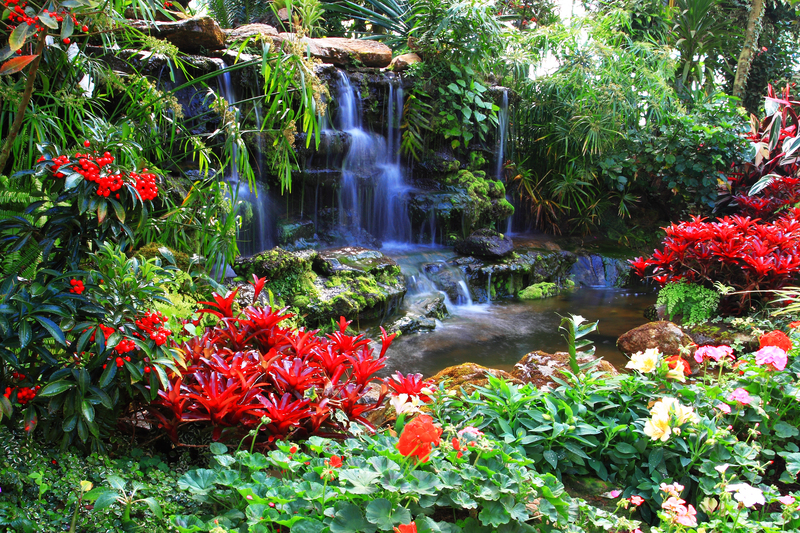Discover the Secrets to Creating a Tranquil Zen Garden
Posted on 13/09/2025
Discover the Secrets to Creating a Tranquil Zen Garden
Imagine escaping the hustle and bustle of everyday life and entering a space dedicated to serenity, contemplation, and harmony. That's exactly what a Zen garden offers. Known as Japanese rock gardens or "Karesansui," these artistic landscapes emphasize simplicity, balance, and calm. Whether you have a sprawling backyard or a small balcony, it's possible to create your own slice of tranquil paradise. Dive into this definitive guide and discover the secrets to crafting a peaceful Zen garden that soothes your senses and nourishes your mind.
Understanding the Essence of Zen Gardens
Before you embark on your Zen gardening journey, it's important to grasp the philosophy behind these captivating spaces. Originating in Japan, Zen gardens serve as physical representations of nature and are designed for meditation, reflection, and mindfulness. When you create a Zen garden, you're not simply landscaping; you're crafting an atmosphere that encourages deeper connection with yourself and the natural world.
Key Principles of Zen Garden Design
- Simplicity: Zen gardens embody minimalism. Each element is chosen deliberately and placed with intention.
- Symbolism: Rocks, gravel, and plants are not just decorative; they symbolize mountains, rivers, animals, and the broader universe.
- Balance: Harmony between elements creates a sense of peace and invites contemplation.
- Natural beauty: Keeping things organic and avoiding artificial materials helps to deepen your connection with nature.
- Continuous change: As seasons change, so does the scenery. Zen gardens invite you to appreciate the transient beauty of nature.

Getting Started: Planning Your Zen Garden
Choosing Your Space
You don't need a massive outdoor area to design a Zen-inspired garden. Zen gardens come in all sizes from expansive temple courtyards to desktop miniatures. Consider the following options:
- Backyards — Ideal for larger rock and sand compositions.
- Patios or balconies — Perfect for container gardens or smaller arrangements.
- Indoors — Tabletop Zen gardens bring tranquility to your workspace or home office.
Make sure your chosen spot receives enough natural light, is easily accessible, and has good drainage if outdoors.
Mapping Out Your Garden Design
Once you've selected your location, sketch a rough plan. Think about the overall shape: traditional Zen gardens are rectangular, but you can adapt to any available space. Leave some open areas for sand or gravel, as they offer visual relief and focus.
Essential Elements of a Zen Garden
The authenticity and beauty of a Zen landscape lies in its thoughtful selection of features. Let's walk through the core components:
1. Rocks and Stones: The Structure
Rocks symbolize timelessness, strength, and the skeleton of the earth. Arrange them in groups (often in threes) to represent islands, mountains, or animals. Vary size, shape, and texture for visual interest.
- Placement: Partially bury rocks for a natural look.
- Types: Use weathered or smooth stones, depending on the mood you wish to create.
2. Gravel or Sand: The Flow
Gravel or sand serves as the foundation of most classic Zen gardens. Raked carefully, it symbolizes water--rivers, oceans, or gentle waves.
- Color: White or light-colored gravel enhances reflection and light.
- Maintenance: Rake into flowing patterns (ripples, circles, etc.) for a meditative practice.
3. Plants: A Touch of Life
Though traditional large-scale Zen gardens are sparse in plant life, a modern tranquil Zen garden can include selected greenery. Choose plants that evoke calm and require little maintenance.
- Mosses: Symbolize stability and endurance. Ideal for shaded or moist areas.
- Bamboo: Represents flexibility and strength. Use as screening or fencing.
- Ferns, small pines, or Japanese maples: Add delicate beauty and seasonal interest.
4. Water Features: Sound and Movement
Although many Zen gardens represent water with gravel, a physical water feature--such as a small pond or a bamboo water fountain (shishi-odoshi)--adds soothing sound and movement. Water elements reinforce tranquility and mindfulness.
5. Additional Accents: Enhancing Zen Ambience
To personalize your Zen retreat, consider subtle decor:
- Stone lanterns or pagodas for spiritual ambiance.
- Benches or meditation stones for seating and reflection.
- Simple stepping stones to guide your journey through the garden.
Step-by-Step Guide to Creating Your Zen Garden Sanctuary
Let's put theory into practice! Follow these steps to create a peaceful Zen garden at home:
Step 1: Prepare Your Site
- Clear the area of weeds, debris, and clutter.
- Level the ground and install a weed barrier if desired.
- Frame the garden with wood, stone, or metal edging to contain gravel or sand.
Step 2: Position Large Rocks and Stones
- Visualize focal points -- place larger rocks off-center or in asymmetrical groupings.
- Bury about one-third of each stone to mimic natural placement.
Step 3: Add Gravel or Sand
- Evenly spread a layer at least 2 inches thick.
- Use a wide-toothed rake to create flowing, meditative patterns.
Step 4: Plant Carefully Chosen Greenery
- Select slow-growing, low-maintenance plants like moss, miniature conifers, or groundcovers.
- Group plants in odd numbers and avoid over-planting.
Step 5: Incorporate Water and Decorative Features
- Install a small fountain, birdbath, or pond if space allows.
- Add a weatherproof bench or meditation seat for relaxation.
- Arrange lanterns or stepping stones for gentle illumination and movement.
Zen Garden Maintenance Tips for Long-Lasting Tranquility
A peaceful Zen garden isn't a "set and forget" project--it thrives with regular care. Here are simple tips to keep your garden inviting and serene:
- Rake gravel or sand regularly: Enjoy the mindful act of pattern raking as a meditative ritual.
- Remove fallen leaves and debris: Keep the landscape tidy for unobstructed beauty.
- Prune plants minimally: Trim for shape but avoid overworking for a natural look.
- Monitor rocks and structures: Re-set stones if ground shifts.
- Refresh plants and stones: Replace anything that becomes damaged or worn.
Benefits of Having a Zen-Inspired Garden
The allure of a Zen style garden extends far beyond its visual elegance. Owning, tending, and spending time in a Zen garden offers a wealth of advantages:
- Mental clarity & relaxation: Regular contemplation in a Zen garden lowers stress and anxiety levels.
- Mindfulness cultivation: Practicing meditation or quiet reflection amidst simple beauty fosters presence and gratitude.
- Natural connection: Even small Zen gardens inspire appreciation of seasons and change.
- Creative expression: Each Zen garden is unique, reflecting your personal sense of balance and beauty.
- Low-maintenance landscaping: Compared to traditional gardens, Zen gardens require less watering, mowing, and fertilizing.
Inspirational Zen Garden Ideas for Every Space
Wondering how to tailor your Zen garden design to fit your lifestyle and home? Here are some creative examples:
1. Minimalist Courtyard Sanctuary
- Pale gravel, two or three bold stones, bamboo screening, and a single lantern provide focus and calm.
2. Modern Patio Zen Retreat
- Arrangements of pebbles, moss-filled pots, and a trickling tabletop fountain create a peaceful spot even in urban settings.
3. Balcony or Rooftop Miniature Zen Garden
- Use shallow trays filled with sand, a few handpicked rocks, and tiny succulents or air plants to evoke tranquility in micro spaces.
4. Indoor Office Zen Desk Garden
- A small tray with fine gravel, miniature rake, and a single polished stone offers a mindful break during your workday.
Common Zen Garden Mistakes to Avoid
To ensure your tranquil Zen garden achieves its purpose, steer clear of these frequent errors:
- Overcrowding: Less is more! Avoid packing in too many rocks, plants, or ornaments.
- Using artificial elements: Stick to natural materials as much as possible.
- Ignoring maintenance: Regular attention is required to preserve the clean lines and patterns of your garden.
- Lack of thoughtful placement: Every element should serve a purpose, both symbolically and visually.

Frequently Asked Questions About Zen Gardens
Can I create a Zen garden if I have limited space?
Absolutely! Zen-inspired gardens thrive at any scale, even in small containers or on windowsills. Focus on a few high-quality, harmonious elements.
What do the patterns in the gravel mean?
Raked lines typically represent water, waves, or currents. Circular patterns can symbolize ripples around islands (rocks). Designing these patterns is a mindful exercise and a form of meditation.
Do I need many plants in my Zen garden?
Not at all. Traditional Zen gardens often feature minimal or no plant life, relying on rocks, gravel, and sand to convey the essence of nature. If you prefer greenery, incorporate modest amounts for a modern or lush look.
How do I maintain the peaceful look of my Zen-inspired garden?
Commit to periodic raking, occasional pruning, and removal of any litter or weeds. The act of maintenance itself can be calming and restorative.
Embrace Stillness: Your Zen Garden Awaits
In today's fast-paced world, cultivating a tranquil environment is more important than ever. A Zen garden isn't just a design trend; it's a practical way to nurture mindfulness and tranquility at home. By understanding its core principles, curating meaningful elements, and making maintenance a soothing ritual, you'll create a welcoming space that offers refuge, focus, and inspiration year round.
Start your journey now--discover the secrets to creating a Zen garden where peace flows as freely as water, stones stand as silent witnesses to change, and every moment in your sanctuary helps you rediscover yourself. Whether you're meditating, unwinding, or simply admiring the view, your Zen garden will become a timeless source of joy and serenity.
Ready to design your oasis? Begin with a single stone, a patch of sand, and an open mind. Let your Zen garden grow as a reflection of your path toward inner calm.

